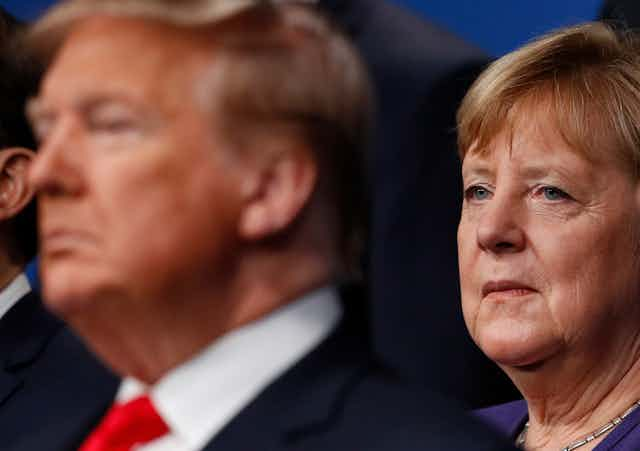Celebrity met statesmanship in the form of Arnold “the Governator” Schwarzenegger, and more recently, in the presidency of former reality star Donald Trump.
Celebrities entering politics is an international pasttime. Brazilian footballer-turned-senator Romário de Souza Faria, singer Bobi Wine as runner-up in the (contested) Ugandan presidential elections, and comedian Volodymyr Zelensky as Ukrainian president are all examples.
The ceaseless struggle for media attention in our modern political environment has given rise to another phenomenon: politicians who become celebrities themselves. These politicians style themselves as appealing public personae, and constantly seek publicity through social appearances and proactive engagement with media.
The charismatic Barack Obama and clownesque Boris Johnson have both successfully converted the resulting media attention into political power. US congresswoman Alexandria Ocasio-Cortez regularly goes viral on social media, and recently attempted to promote progressive policymaking by flaunting a “Tax the Rich” dress at the Met Gala.
Amid the Trumps and Johnsons of the world, can “traditional” politicians still compete for power? This is where the anti-celebrity politician comes in. Dressing and behaving inconspicuously, and ostensibly lacking media savviness, the anti-celebrity politician embodies the opposite qualities to celebrity stardom. He or she avoids the limelight, and flourishes when fatigue with celebrity figures sets in.
The recent German election gives us two examples. The Social Democratic election winner Olaf Scholz displayed an uncharismatic and technocratic air that earned him the nickname “Scholz machine”.
Scholz carefully copied the image of stability projected by Chancellor Angela Merkel – the quintessential anti-celebrity. Merkel’s politics appeared nonstaged and she was known for her apparent sincerity, neutral appearance, avoidance of media show and controversy, and lack of emotion and impulsiveness.
The histories of celebrity politicians and their anti-celebrity counterparts are intertwined. Anti-celebrity politics only appeals in contrast to celebrity politics.
Celebrity culture, in which media showcase public figures’ personalities and private lives to an expanding consumerist audience of “fans”, emerged in the late eighteenth century. Politicians like the first American president George Washington bolstered their popularity by avoiding celebrity stardom, seeking strategic publicity instead.
A century later, the emerging modern press industrialised this culture, with stories about celebrities now reaching a mass audience. Photography and film meant that this audience could now “see” these celebrities, making the relationship between idol and fan more intimate.
This translated to politics as well. International newspapers heralded Paul Kruger, president of the South African Republic during the Boer War, as a simple, devout and traditional man – in stark contrast to the obsession with a new “modernity” around 1900. This was in comparison to his British celebrity nemeses, the colonial secretary Joseph Chamberlain and mining magnate Cecil Rhodes.
In the 20th century, new forms of mass media such as radio, television and the internet further bolstered celebrity politics. However, this reinforcement also contributed to a saturation with celebrity politicians, and demand for “authentic” alternatives.
Comparisons and contrasts
Anti-celebrity politicians are often defined in contrast to their predecessors and contemporaries. Following the media frenzy surrounding Nicolas Sarkozy, the mediagenic and attention-seeking French president, the public welcomed his dull successor François Hollande as a return to normality (though he quickly became incredibly unpopular).
This also occurs in international politics. John F. Kennedy’s glamorous “Camelot” presidency enabled Hồ Chí Minh to adopt the role of the anti-celebrity leader during the Vietnam War. Merkel has appeared favourably in media in contrast with both her celebrity predecessor Gerhard Schröder within Germany, and her contemporary Donald Trump on the world stage.

The effect of anti-celebrity politics depends on the local political and media system. In a presidential system with a highly commercialised media market, like the US, there is a strong focus on individual politicians and celebrity culture. While this situation initially favours celebrity politicians, it can also create a backlash and consequent demand for anti-celebrities.
Media loved the saxophone-playing Bill Clinton, but their overexposure of his scandals paved the way for George W. Bush, who, despite his well-known family name, constituted a rather nondescript politician.
In a parliamentary system with a more regulated media environment, like the UK, the public votes for a party rather than an individual, and broadcasters must adhere to stricter regulations on political coverage. This system enables the less showy to climb the political ranks relatively protected from a commercial media logic.
The British system thus enabled the uncharismatic Gordon Brown to take over the premiership from the celebrity Tony Blair in 2007 through the “internal route” of winning the Labour Party leadership. Brown admired the anti-celebrity prime minister Clement Attlee, who succeeded the larger-than-life Winston Churchill. However, Brown’s lack of media appeal prevented him from winning a second term in the 2010 general election.
Rising stars
Recent weeks have brought the fall of one celebrity politician and the rise of another. Austrian Chancellor Sebastian Kurz resigned following allegations that he financed his media glitz with tax money. Meanwhile, French writer and pundit Éric Zemmour has surged in the polls, fashioning himself as a Trump-like outsider who may trade TV stardom for a presidency.
Read more: Éric Zemmour: the far-right polemicist’s ideas have a long history in France
The anti-celebrity image offers traditional politicians an attractive path to power amid the media savvy methods of many populists. Yet constructing and maintaining this image actually requires great media skill, navigating carefully measured media exposure to claim political successes and avoid publicity of failures.
Aided by a loyal team of PR advisors, Merkel sustained her anti-celebrity reputation for 16 years, but will her successor? And rather than a glitzy Kurz or Zemmour, another anti-celebrity might yet shake up the Austrian and French elections.

